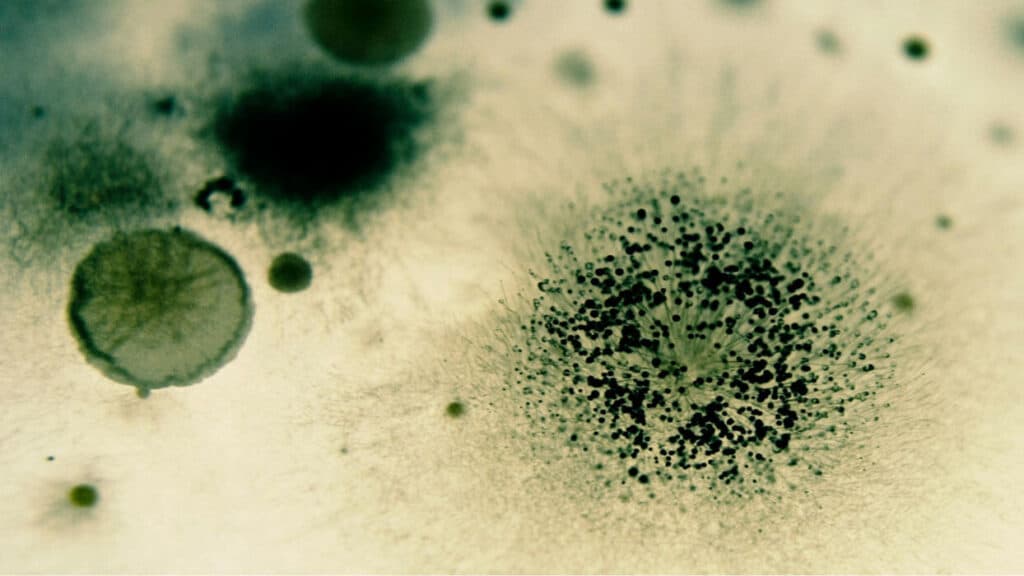A prevalent but potentially harmful homeowner complication, mold (sometimes called “black mold”), accumulates when a high concentration of spores collects indoors. Microscopic spores exist in nearly every indoor environment, but pesky mold appears when optimal conditions allow these microbes to amass and thrive.

Where does mold come from?
Mold is a type of fungus, so it reproduces by releasing airborne spores that flourish in moist environments. The mold feeds on dust or dirt and thrives in the mild, stable temperatures in most homes. This makes essentially any household the ideal habitat for mold growth and reproduction.
Even the tiniest residential leak or regular water mist can lead to mold accumulation. Homeowners often realize its presence after a significant storm or plumbing leak initially unnoticed. Read on to learn more from Benditt Mechanical about mold prevention and remediation in Philadelphia and the surrounding areas, including Newtown Square, Ardmore, and Radnor.
What are the symptoms of mold presence?
In terms of color and texture, mold varies largely in appearance, so sometimes, it can be hard to tell if that colored spot is a simple old stain or the beginning of a mold problem. There are a few ways to determine whether that questionable splotch is mold:
- Noticeable musty odor
- Source of moisture but a minor source of light
- Warping or abrasion of the affected area
- Size growth over time
Unfortunately, the house’s structure isn’t the only thing affected by the presence of mold. It’s also a common allergen and can even cause infections in immune-compromised individuals. Direct contact with (touching or inhaling) spores can cause the following mild symptoms:
- Runny nose
- Congestion
- Coughing
- Sneezing
- Rash
- Sore throat
- Wheezing
- Headache
Although most people exposed to mold will not constitute a medical emergency, it can potentially exacerbate certain health conditions. If you suspect mold in your home and a family member shows consistent symptoms of exposure, reach out to Benditt Mechanical for professional consultation, mold removal, and cleanup.
What are the repercussions of mold?

Luckily, most household molds are not toxic; they’re allergenic, meaning they’re unlikely to cause any significant health problems or fatalities. They do, however, have the potential to aggravate pre-existing conditions such as asthma and weaken the immune system.
Many homeowners are concerned about black mold, which is the layman’s term given to harmful molds that result in respiratory distress. Many believe that this broad mold category can lead to lung disease or cancer, but those claims are unfounded. Even though this “toxic” form of mold (usually in reference to the species Stachybotrys chartarum) can lead to wheezing, shortness of breath, sinusitis, and other mild respiratory symptoms, the Center for Disease Control (CDC) asserts that there are very few reports of rare health conditions resulting from household mold.
In immune-compromised and high-risk individuals, long-term exposure can lead to fungal infections. Extensive, specialized immunotherapy is the preferred treatment course for severe or debilitating mold allergies.
Mold also has the potential to cause structural damage to your home if left untreated. The fungus can eat away at nearly any building material, including but not limited to drywall, wood, carpeting, and tiles. Undiagnosed mold infestations with the opportunity to thrive can eventually cause walls, roofs, ceilings, and floorboards to collapse or cave in.
How can I prevent mold from accumulating?
As previously mentioned, three optimal conditions lead to mold growth: a source of food (organic debris), moisture, and a stable temperature. However, completely ridding your home of dust or setting it to an unlivable temperature is not always attainable. As a result, you must monitor and regulate the humidity in all areas of your home. The Environmental Protection Agency (EPA) recommends reducing indoor humidity to less than 60% to discourage mold development.
Although common causes of mold include burst pipes or significant water intrusion, even small amounts of moisture can lead to mold accumulation. The EPA contests that mold can grow in as little as 24 hours if building materials aren’t cleaned and dried soon enough.
Diligent homeowners can take these simple steps towards mold prevention:
- Don’t install carpet in areas with high humidity or frequent moisture
- Add insulation to prevent condensation on surfaces
- Use exhaust fans when cooking and cleaning
- Utilize air conditioning and dehumidifiers
- Clean gutters frequently and redirect downspouts

How do I remove mold and remedy damage? Contact Benditt Mechanical!
Baking soda, hydrogen peroxide, or vinegar are easy remedies to remove minor cases of mold. However, mold situations that go undetected or untreated long enough can cause severe damage to your home or your health. Since physical contact with spores can be harmful, homeowners should contact Benditt Mechanical for mold remediation in Philadelphia for proper removal and restoration.
